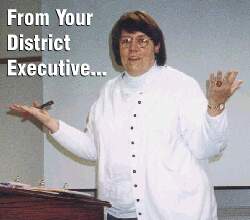 |
Volume 3, Number 3 |
|
There are multiple ways that we are a diverse people. We have theological differences; ages that span more than 100 years; some racial and cultural diversity, especially in our Sunday Schools; and diversities of opinions about many topics from politics to favorite novels. We also have much in common with each other, as the survey from the Fulfilling the Promise Committee reported to us in 1998. (You can read this on line at the uua.org web site in the “Fulfilling the Promise” section.) I believe that the first place for us to start thinking about diversity is inside ourselves. Our minds can and do affirm a wide variety of ways to be fully human. Our hearts are not always caught up to our minds on this one. How do the lifestyle choices of another impact you? How comfortable are you singing the words to a hymn that does not reflect your own way of understanding the world? How do you disagree with others in your congregation when they seem to be saying things that deny your closely held beliefs or world view? How do you express your vision, belief or concern in a way that does not attempt to destroy another’s view? These are the questions at the beginning of our yearnings to be diverse. In our congregations, the keys to the diversity we have already affirmed must be found in the vision, values and mission of the congregation. The vision of your congregation paints a word picture that reflects what the world will look like if you are successful in actualizing your dreams. Anne Odin Heller, in her excellent book, Churchworks, links vision and the values that guide the life of the congregation. You must know what common values you will be accountable to and for in your movement toward your vision. Without a common understanding of the values that will guide your work, it is too easy to run amuck and run roughshod over the people and processes that may differ with you. In order to maintain its values, the community develops covenants. Covenants are the promises the members make to each other about their behavior as they try to stay as close as they can to their values. Congregational covenants give the members of our churches and fellowships the needed tools to hold each other accountable for the common life of the community as it works together. The Mission of your congregation is the mirror to each other and to the larger world that tells them the “why and who” of your existence? Why is it necessary for there to be a Unitarian Universalist congregation in your community? Why do you exist? Who are you as a congregation? Your mission tells the larger world what you stand for. Anne Heller says, “A congregation’s mission, deeply felt, shines out of its members’ eyes. It informs their work as a religious community so members of the congregation and the larger community, know who they are and what they stand for.” Notice, that the emphasis here is on mission not statements. Missions come from the hearts, minds and spirits of the members of the congregation. Statements are just our attempts to get our “whys” and values on paper to remind us of the excitement and passion we feel about the work we are attempting to do together. The statements are not unimportant, for we need the common documents of our commitments and vision to keep us on track sometimes, but the process of bringing the documents into existence is what really matters. It is important that we ask each other about the deepest yearnings we have for our communities. When we do, we often find ourselves in the presence of staggering hope, love, vision and the need to make the world more just. It can be a profound experience when we hear what others in our community yearn for. Often their yearning sparks in us a sense of possibility and wholeness that is rare in our culture. This is religious work. When we know who we are and what we want, and know where our resistance is and where our commitments and values are, we can then look at how to make our congregations more diverse. Diversity is not a goal, but the by-product of doing the heart, and hard work of defining ourselves singly and in community. If any of this rings true for you and you want to talk about how to do this in your congregation, please call the District office. — REV. MARY CHULAK HIGGINS, DISTRICT EXECUTIVE |
|
 By
the time you receive this copy of the Sunshine, our District Annual
Assembly will be upon us. The topic of our keynote this year is diversity
and how all the diversity we invite impacts our UU movement. I do not
know what Stefan Jonasson, our keynote speaker, is going to say, but
I would like to share with you the foundations of diversity as I see
them. I believe the diversity that will enhance our congregational life
will ask deeper, more personnel questions then what should we “do.”
It will be asking questions of whom we “are” and whom we want to “become,”
and “how” we want to change the world.
By
the time you receive this copy of the Sunshine, our District Annual
Assembly will be upon us. The topic of our keynote this year is diversity
and how all the diversity we invite impacts our UU movement. I do not
know what Stefan Jonasson, our keynote speaker, is going to say, but
I would like to share with you the foundations of diversity as I see
them. I believe the diversity that will enhance our congregational life
will ask deeper, more personnel questions then what should we “do.”
It will be asking questions of whom we “are” and whom we want to “become,”
and “how” we want to change the world.